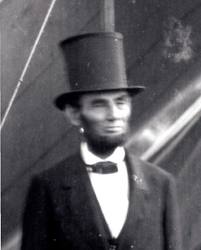Want A Good Ad? Conceal The Premise.
We’re all more or less familiar with the syllogism. The idea is that we can state premises – with certain rules – and draw conclusions that are logically valid. So we might say:

Cute. Must be a great car.
Major premise: All humans are mortal.
Minor premise: Travis is a human.
Conclusion: Therefore, Travis is mortal.
In this case, the syllogism is deemed valid because the conclusion flows logically from the premises. It’s also considered sound since both premises are demonstrably true. Since the syllogism is both valid and sound, the conclusion is irrefutable.
We often think in syllogisms though we typically don’t realize it. Here’s one that I go through each morning:
Major premise: People get up when the sun rises.
Minor premise: The sun is rising.
Minor premise: I’m a person.
Conclusion: Therefore, I need to get up.
I don’t usually think, “Oh good for me … another syllogism solved”. Rather, I just get out of bed.
We often associate syllogisms with logic but we can also use them for persuasion. Indeed, Aristotle identified a form of syllogism that he believed was more persuasive than any other form of logic.
Aristotle called it an enthymeme – it’s simply a syllogism with an unstated major premise. Since the major premise is assumed rather than stated, we don’t consider it consciously. We don’t ask ourselves, Is it valid? Is it sound? We just assume that everything is correct and get on with life.
Though they don’t use the terminology, advertisers long ago discovered that enthymemes are powerful persuaders. People who receive the message don’t consciously examine the premise. That’s exactly what advertisers want.
As an example, let’s dissect one of my favorite ads: the 2012 Volkswagen Passat ad featuring the kid in the Darth Vader costume. The kid wanders around the house trying to use “The Force” to turn on the TV, cook lunch, and so on. Of course, it never works. Then Dad comes home, parks his new Passat in the driveway, and turns it off. The kid uses the force to turn it back on. Dad recognizes what’s going on and uses his remote starter to start the car just as the kid hurls the force in the right direction. The car starts, the kid is amazed, and we all love the commercial.
So what’s the premise? Here’s how the ad works:
Major (hidden) premise: Car companies that produce loveable ads also
produce superior cars.
Minor premise: VW produced a loveable ad.
Conclusion: Therefore, VW produces superior cars.
When we think about the major premise, we realize that it’s illogical. The problem is that we don’t think about it. It enters our subconscious mind (System 1) rather than our conscious mind (System 2). We don’t examine it because we’re not aware of it.
Here’s another one. I’ve seen numerous ads in magazines that tout a product that’s also advertised on TV. The magazine ads often include the line: As Seen On TV. Here’s the enthymeme:
Major (hidden) premise: Products advertised on TV are superior to
those that aren’t advertised on TV.
Minor premise: This product is advertised on TV
Conclusion: Therefore, it’s a superior product.
When we consciously examine the premise, we realize that it’s ridiculous. The trick is to remind ourselves to examine the premise.
If you want to defend yourself against unscrupulous advertisers (or politicians), always be sure to ask yourself, What’s the hidden premise?
Aristotle, HBR, and Me
I love it when the Harvard Business Review agrees with me. A recent HBR blog post by Scott Edinger focuses on, “Three Elements of Great Communication, According to Aristotle“. The three are: ethos, logos, and pathos.
Ethos answers the questions: Are you credible? Why should I trust your recommendations? Logos is the logic of your argument. Is it factual? Do you have the evidence to back it up? (Interestingly, the more ethos you have,the less evidence you need to back up your logos. People will trust that you’re credible). Pathos is your ability to connect emotionally with your audience. If you have high credibility and impeccable logic, your audience might conclude that you could take advantage of them. Pathos reassures them that you won’t — your audience knows that you’re a good citizen.
When I teach people the arts of public speaking, I generally recommend that they start by establishing their credibility (ethos). The trick is to do this without overdoing it. If you come across as a braggart, you reduce your credibility rather than burnishing it. A good tip to remember is to use the word, “we” rather than “I”. “We” implies teamwork; “I” implies an egocentric psychopath.
After establishing your credibility, you proceed to the logic (logos) of your argument. What is it that you’re recommending and why do you think it’s a good solution for the audience’s needs? It’s often a good idea to start by defining the audience’s needs. Then you can fit the recommendation to the need. Keep it simple and use stories. Nobody remembers abstract logic and difficult technical concepts. They do remember stories.
Think about pathos both before the speech and in the conclusion. Ideally, you can meet the audience before your speech, ask insightful questions, and make personal connections. The more you can talk to members of the audience before the speech, the better off you’ll be. Look for anecdotes that you can use in your speech — that also builds your credibility. If nothing else, spend the last few minutes before your speech shaking hands with audience members and thanking them for coming to your speech. At the end of your speech, you can return to similar themes and express your appreciation. It’s also appropriate (usually) to point out how your recommendation will affect members of the audience personally. For instance, “We believe that our solution will help your company be more efficient. It will also help you build your career.”
Those of you who have followed my website for a while may remember my videos on ethos, logos, and pathos. I made them when I worked at Lawson Software and was teaching communication skills internally. Again, I’d like to thank Lawson for allowing me to use these videos on this website as I build my own practice.
By the way, all these suggestions apply to deliberative speeches. You present a logical argument and ask your audience to deliberate on it. On the other hand, you can also give a demonstrative speech where you throw the logic out altogether. They’re often called barn burners or stem winders. You can learn more here.
Illogical Excuses (That Work)
I’ve read Robert Cialdini’s Influence: The Psychology of Persuasion at least three times over the years. Every now and then I go back and re-read a chapter at random. Each time I do, I learn (or re-learn) something useful. Here’s an interesting study that I re-discovered on my last excursion.
The study goes back to the days when students stood in long lines at college libraries to use photocopy machines. (Yes, we actually copied physical pages rather than saving electronic pages to our hard drives). On particularly busy days — just before the end of a term, say — you might stand in line for well over an hour.
Some researchers decided to study a fairly basic question — under what conditions would students allow another student to cut into the line? Using the terminology of communication, persuasion, and compliance, the research question might be phrased: What communication techniques are most effective in persuading students to comply with a request to cut into the line?
The researchers sent students to the head of the line to test out three different messages. The students randomly asked:
A) May I please cut in line ahead of you?
B) May I please cut in line ahead of you because I have a doctor’s appointment and I’m really in a hurry.
C) May I please cut in line ahead of you because I really need to cut in line.
Being good researchers, you might create three hypotheses:
1) Message A will generate the lowest compliance rate — the message contains no reason for cutting in.
2) Message B will generate the highest compliance rate — the message contains a compelling reason to cut in.
3) Message C’s compliance rate will fall somewhere between A and B — the message contains a reason but it’s illogical.
As it happens, you would be right on Hypothesis 1. Students in the line were much less likely to comply with the request when the would-be cutter offered no reason.
On Hypothesis 2, you would be partially right. A compelling reason — the need to visit a doctor — does generate much higher compliance rates.
But does Message B generate the highest compliance rate? Well, … no… and here’s the surprise: the compliance rate for Message C was just as high as that for Message B. It appears that the logic behind the reason is not so important. The mere fact that you give a reason seems to be the important point.
Look a bit more closely at the three messages. Messages B and C contain the word because. Message A doesn’t. It seems that the students in the line responded to that specific word. If they heard because, they knew that a reason would follow. The nature of the reason didn’t seem to matter much. Just stating a reason — no matter how illogical — was sufficient to gain greater compliance. With Message A, students didn’t hear the word that introduces a reason and, therefore, were less compliant.
So the word because can be an important persuader in and of itself. If the person you’re speaking with hears the key word, they expect that a reason will follow … and they may not inspect it very closely. It’s sufficient that a reason is stated.
Of course, this doesn’t work on all occasions. If you come home with lipstick on your collar and reeking of whiskey, you better have a much better reason. In more mundane situations, however, remember the power of because. Why should you remember it? Well, just because.
Little Life Lessons from Lincoln
On July 4, 1863, Robert E. Lee was leading a Confederate army in retreat from Gettysburg when they were trapped against the rain-swollen Potomac River. The Union army, commanded by General George Meade, pursued the rebels. Abraham Lincoln ordered Meade to attack immediately. Instead, Meade dithered, the weather cleared, the river shrank, and Lee and his army escaped. Lincoln was furious and penned this letter to Meade:
I do not believe you appreciate the magnitude of the misfortune involved in Lee’s escape. He was within our easy grasp, and to have closed upon him would, in connection with our other late successes, have ended the war. As it is, the war will be prolonged indefinitely. If you could not safely attack Lee last Monday, how can you possibly do so south of the river, when you can take with you very few— no more than two-thirds of the force you then had in hand? It would be unreasonable to expect and I do not expect that you can now effect much. Your golden opportunity is gone, and I am distressed immeasurably because of it.
Interestingly, Lincoln never sent the letter — it was found among his papers after his death. Lincoln generally praised his colleagues for their positive accomplishments and said little or nothing about their failures. Apparently, he wrote letters like the one to Meade to relieve his own frustrations — and perhaps to leave a record for history — rather than to humiliate his colleagues and create public acrimony.
As Douglas Wilson, a Lincoln scholar, pointed out in a recent article (click here), Lincoln was great communicator but not necessarily in the way we think. Some tidbits on how he worked:
- He rarely spoke in public and when he did he was very well prepared. We think of the Gettysburg Address and the Second Inaugural speech as great feats of oratory — and they were. But there weren’t many such feats; he gave relatively few speeches. And he almost never spoke off the cuff. He knew that people followed his words closely and he prepared meticulously. His speeches were extraordinary. Equally extraordinary is the fact that he almost never said anything stupid that he had to retract. Our politicians and executives today could learn a lot from him.
- He pre-wrote his speeches. Lincoln always had scraps of paper with him — which he often stored in his hat. When an idea — or an elegant way to phrase an idea — came to him, he jotted it down. He didn’t start thinking about his speeches when a deadline drew near. He was thinking about them virtually all the time.
- He was mercifully brief. The Gettysburg Address consisted of 267 words. By contrast, this post has about 600. Which one do you think will live longer?
- He cultivated the press before he needed them. In general, Lincoln got to know his audience before he spoke to them. He gave favors to journalists before he asked for favors in return. Getting to know your audience and letting them know that you genuinely care about them are always good strategies.
- He understood event jujitsu. The Civil War began with the crisis at Fort Sumter in Charleston harbor. Lincoln could have sent in a fleet to shoot up the Confederate fortifications. Instead, he sent in a small re-supply mission. When the Confederates sought to block the mission, they fired the first shots of the war. It’s a small leap to conclude that the Confederates “started” the war. Thus, a small incident became a major victory in the battle to shape perceptions.
Lincoln has always been one of my favorite presidents and I certainly enjoyed the recent movie from Steven Spielberg. Lincoln communicated effectively and was an expert at shaping public opinion. As the movie showed, he was also adept at cutting deals and rolling logs to achieve his greater goals. Not bad for a kid from the prairies.
Christmas – Deadliest Day of the Year

Drop by any time.
Here’s a little exercise in critical thinking. More people in the United States die on Christmas Day than on any other day of the year. It’s our deadliest day. New Year’s Day is the second deadliest day.
The first question a critical thinker would ask is: Is that really true? Here’s the evidence: an article published in Social Science and Medicine in October 2010, that analyzed 54 million death certificates from 1979 through 2004. (Click here for the abstract and charts; the full-text is behind a pay wall). Regardless of the setting or the cause, the number of deaths clearly peaks on Christmas Day. This affects all demographic groups, except children.
The next question a critical thinker might ask is: Why would that be? Here the logic gets a little fuzzy. As the authors of the research paper point out, they tested nine different hypotheses but believe more research is necessary. So let’s think about it a bit.
- Hypothesis 1: Perhaps it’s because people overeat on Christmas Day, overloading the digestive system, causing systemic stress and death. Really? One big meal causes death? If that’s the case, many of us would be long gone already.
- Hypothesis 2: It’s the stress of having all those family members and in-laws around. True, that’s a lot of stress but a lot of other holidays cause stress as well. If that’s the case, why wouldn’t we also see spikes on Thanksgiving or July 4th?
- Hypothesis 3: maybe sick people hang on until Christmas and then let go. It’s possible — people can and do keep themselves alive until a big event. But that doesn’t explain why mortality rises in the days and weeks before Christmas. If people were hanging on, you would expect to see a dip in deaths just before Christmas.
The hypothesis I like — which I spotted in the Daily Beast (click here) — is that Christmas isn’t abnormal in terms of life-threatening incidents, but is abnormal in the way people behave when a life-threatening incident occurs. If you feel chest pains on any random day, you may just head straight for the hospital. That’s a good idea because the sooner you get there, the better your chances of survival. On Christmas, however, people may delay, not wanting to spoil the festive atmosphere or leave the family celebration. They may also believe that they’ll get poor service at the hospital on Christmas. The hospital will likely be understaffed or staffed by second stringers, etc. Better to wait ’til tomorrow to get better service.
The next question a critical thinker might ask is: If this is true, what should we do about it, if anything? This hypothesis, of course, is not fully tested. We can’t claim conclusively that it’s true. But there is a certain logic about it. Perhaps enough that we can make Pascal’s wager — the evidence isn’t conclusive but it’s strong enough to make a bet. If we’re wrong we don’t lose much. If we’re right, we can save a lot of lives. So, what do we do? Perhaps we can advertise the phenomena and encourage people to get to the hospital quickly, even if it is Christmas. In fact, consider this article a public service announcement. If you have chest pains today, get your butt to the hospital pronto!
Merry Christmas!


